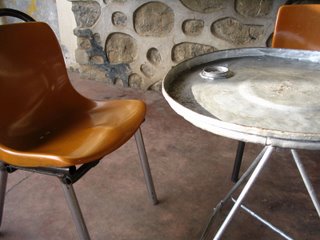***********************
February 14th 2006
Yet another trip to the field. This time, I must go to Dekese, a village so isolated that it usually takes a 2-day drive from the small town of Lodja to get there. Luckily, we hear of a decent airstrip in the village and contact a private company that can fly there in a 9-seater. This being a particularly important mission, we decide to accept the high price of $3,225 for 2 hours of flying. At that price, I’d rather travel by helicopter.
Though I have deposited my passport to immigration authorities (DGM) in Kinshasa nearly three weeks ago, I still do not have a new visa. The man there issues me three temporary papers, reassuring me that they are legitimate and I should have no problem travelling with them. He adds that anyone asking for extra money to process these documents is a briber and I should not pay him. “Easy for you to say”, I think to myself, “your not the one getting bribed even when your papers are in order”. I silently chuckle at the situation, finding it ironic that the head of immigration in Kinshasa knows how corrupt his own employees are.
Finally, I am in the plane towards Kananga, flying over reticulated hills that look like a giant, green cerebrum with alternating patches of light green grasses and dense dark green forests. The few rivers that slither across them take sharp turns reminding me of a fast moving silver snake. From the air, it is obvious that Congo is made up mostly of uninhabited, large expanses, occasionally punctuated by a thin dirt orange roads leading to a few 20-hut villages.
Kananga’s not quite as I remembered it—-being the first city I saw outside of Kinshasa, my first impression was that of a small village. It is in fact a city filled with people buzzing around stores. While the stores are pretty run-down, the buildings have freshly painted signs. It seems like one can buy most anything here and there are certainly more stores around this city centre than around downtown Kinshasa. I am very aware of the people staring at me, but the stares are polite and discreet. I walk down the busy streets tensely, fully cognizant of being the only white person around.
It is said that the Belgians once planned for Kananga to be the largest city in Congo since it sits squarely in the middle of the country. That evening we stay in a very basic but clean hotel. Built in 1937, it now wears a sign that announces “One of the First Great Hotel in Africa”. I look forward to have a nice shower after the trip tiredness and the long walk through the dusty city. I turn on the tap, only to find that there is no running water. I had forgotten how cold bucket baths could be. I promptly crash at 7:00PM sleeping soundly until 7:00AM woken only once by the sound of water rushing through the pipes at around 2:00AM.

The tables and chairs are made from recycled oil and gasoline barrels (note the opening to the spout on the table). It's oh-so-very-Ikea.
1 comment:
So the water only runs when they're sure no one will use it? :)Those air fares are insane!!!
-Ammo
Post a Comment